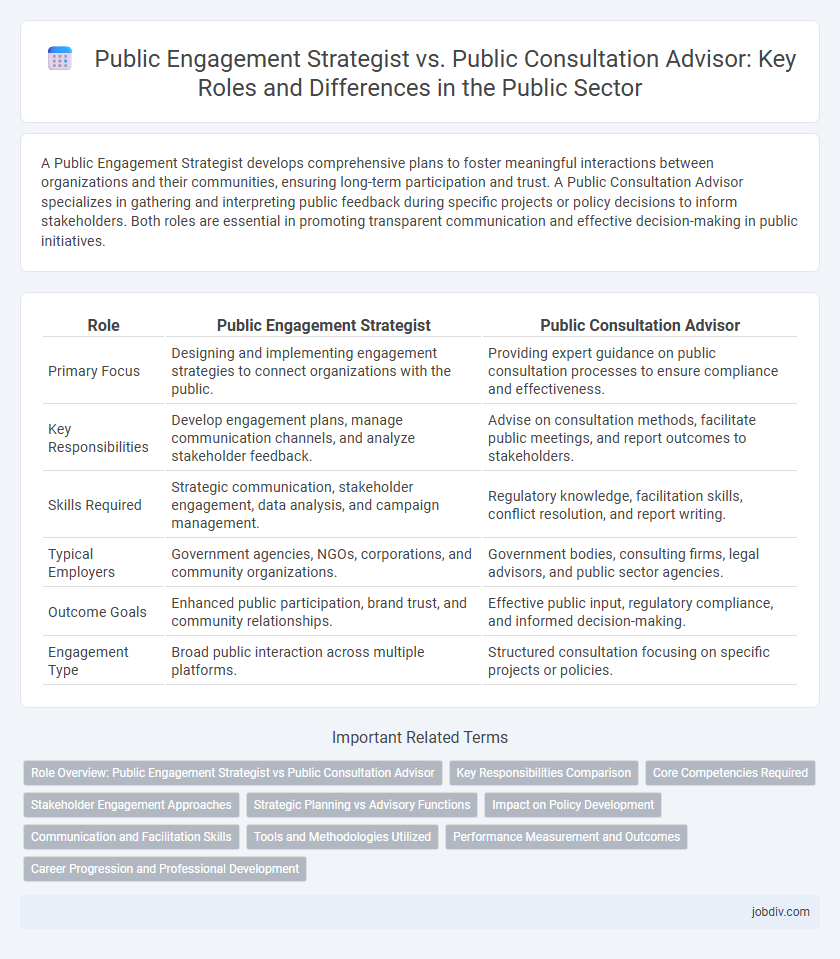A Public Engagement Strategist develops comprehensive plans to foster meaningful interactions between organizations and their communities, ensuring long-term participation and trust. A Public Consultation Advisor specializes in gathering and interpreting public feedback during specific projects or policy decisions to inform stakeholders. Both roles are essential in promoting transparent communication and effective decision-making in public initiatives.
Table of Comparison
| Role | Public Engagement Strategist | Public Consultation Advisor |
|---|---|---|
| Primary Focus | Designing and implementing engagement strategies to connect organizations with the public. | Providing expert guidance on public consultation processes to ensure compliance and effectiveness. |
| Key Responsibilities | Develop engagement plans, manage communication channels, and analyze stakeholder feedback. | Advise on consultation methods, facilitate public meetings, and report outcomes to stakeholders. |
| Skills Required | Strategic communication, stakeholder engagement, data analysis, and campaign management. | Regulatory knowledge, facilitation skills, conflict resolution, and report writing. |
| Typical Employers | Government agencies, NGOs, corporations, and community organizations. | Government bodies, consulting firms, legal advisors, and public sector agencies. |
| Outcome Goals | Enhanced public participation, brand trust, and community relationships. | Effective public input, regulatory compliance, and informed decision-making. |
| Engagement Type | Broad public interaction across multiple platforms. | Structured consultation focusing on specific projects or policies. |
Role Overview: Public Engagement Strategist vs Public Consultation Advisor
A Public Engagement Strategist designs and implements comprehensive communication plans to foster meaningful stakeholder relationships and promote active community participation. In contrast, a Public Consultation Advisor specializes in facilitating structured feedback sessions and analyzing public input to inform decision-making processes. Both roles prioritize effective dialogue but differ in scope, with strategists focusing on long-term engagement frameworks and advisors concentrating on targeted consultation activities.
Key Responsibilities Comparison
A Public Engagement Strategist designs and implements comprehensive communication plans to foster meaningful interactions between organizations and their target audiences, focusing on long-term relationship building and behavior change. In contrast, a Public Consultation Advisor specializes in organizing and managing formal consultation processes, ensuring stakeholder input is systematically gathered, analyzed, and reported to inform decision-making. Both roles require expertise in stakeholder analysis and communication, but the strategist emphasizes strategic outreach and engagement campaigns while the advisor prioritizes regulatory compliance and feedback integration.
Core Competencies Required
A Public Engagement Strategist requires expertise in stakeholder analysis, communication planning, and social media management to effectively design and implement public participation campaigns. A Public Consultation Advisor focuses on strong interpersonal skills, conflict resolution, and data interpretation to facilitate meaningful dialogue and gather community feedback. Both roles demand cultural sensitivity and proficiency in policy development to align public input with organizational goals.
Stakeholder Engagement Approaches
Public Engagement Strategists design comprehensive stakeholder engagement approaches that prioritize inclusive communication, collaborative decision-making, and long-term relationship-building with diverse community groups. Public Consultation Advisors focus on structured feedback mechanisms, utilizing surveys, workshops, and public forums to gather stakeholder input and ensure transparency in policy development. Both roles emphasize active participation but differ in scope, with strategists developing overarching engagement plans and advisors facilitating specific consultation processes.
Strategic Planning vs Advisory Functions
Public Engagement Strategists specialize in strategic planning by designing and implementing comprehensive frameworks to foster meaningful interactions between organizations and their communities. Public Consultation Advisors focus on advisory functions, offering expert guidance on best practices, regulatory compliance, and stakeholder communication during consultation processes. Both roles contribute to effective public involvement but differ in their primary responsibilities, with Strategists driving overarching engagement plans and Advisors ensuring informed, compliant consultations.
Impact on Policy Development
A Public Engagement Strategist designs and implements comprehensive outreach campaigns to build sustained relationships with diverse stakeholders, directly influencing policy priorities through widespread community support. In contrast, a Public Consultation Advisor facilitates focused dialogues and feedback sessions to gather targeted input from specific groups, providing policymakers with nuanced insights that refine legislative proposals. Both roles critically shape policy development by integrating public perspectives, but strategists emphasize broad engagement while advisors concentrate on detailed consultation processes.
Communication and Facilitation Skills
Public Engagement Strategists excel in designing comprehensive communication plans that foster ongoing dialogue and build lasting community relationships, utilizing advanced facilitation skills to encourage inclusive participation. Public Consultation Advisors specialize in managing structured feedback sessions, leveraging targeted communication techniques to extract specific insights and ensure stakeholder concerns are accurately represented. Both roles require adept facilitation competencies, yet strategists emphasize broad engagement frameworks while advisors focus on precise consultation processes.
Tools and Methodologies Utilized
Public Engagement Strategists employ digital platforms such as social media analytics, interactive webinars, and community mapping tools to foster ongoing dialogue and cultivate stakeholder relationships. Public Consultation Advisors primarily utilize structured methodologies like surveys, focus groups, and public hearings to gather specific feedback and inform decision-making processes. Both roles integrate qualitative and quantitative data analysis techniques to measure public opinion and enhance civic participation strategies.
Performance Measurement and Outcomes
Public Engagement Strategists prioritize designing and implementing strategies that foster meaningful stakeholder interaction, using qualitative and quantitative performance metrics to assess engagement effectiveness and community impact. Public Consultation Advisors focus on facilitating specific consultation processes, applying outcome-based evaluation frameworks to measure stakeholder satisfaction and compliance with regulatory standards. Both roles employ data-driven approaches, but Strategists emphasize long-term engagement outcomes while Advisors target immediate consultation performance and legal adherence.
Career Progression and Professional Development
Public Engagement Strategists typically advance by honing skills in stakeholder analysis, communication strategy, and campaign management to lead complex community initiatives, while Public Consultation Advisors focus on mastering regulatory frameworks, participatory methods, and legal compliance to guide effective consultation processes. Career progression for strategists often involves leadership roles in public affairs or corporate communication, leveraging data-driven engagement tools and multi-channel outreach expertise, whereas advisors may move towards policy advisory positions or governance roles with a deep understanding of public sector consultation standards. Professional development for both roles benefits from certifications in public relations, conflict resolution, and digital engagement platforms to enhance influence and efficacy in shaping public opinion and policy.
Public Engagement Strategist vs Public Consultation Advisor Infographic

 jobdiv.com
jobdiv.com